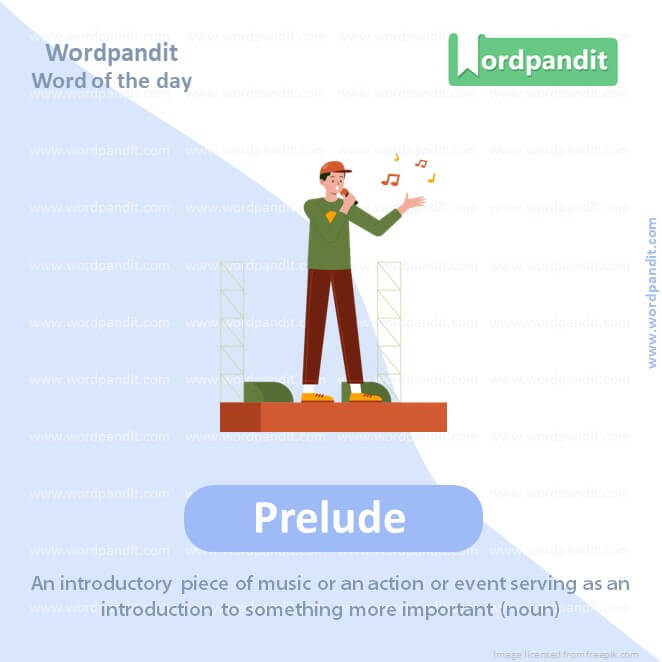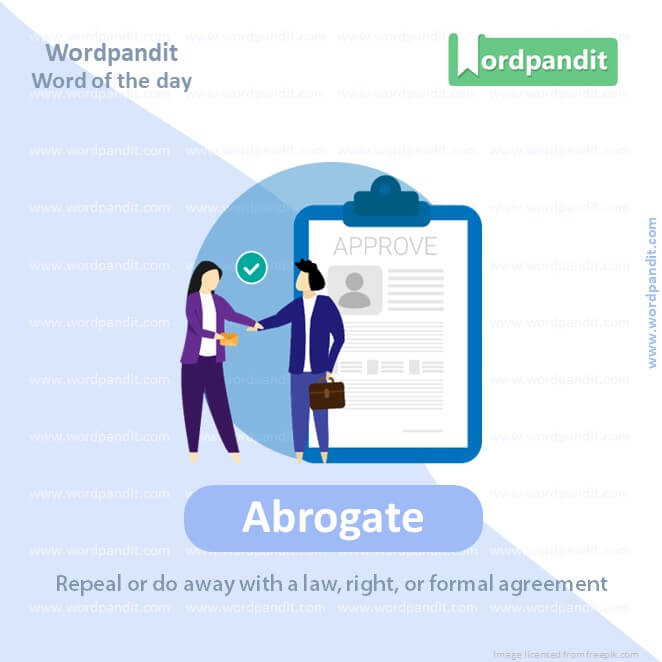Daily Vocabulary Words: List of Daily Used Words in Leading Indian Newspapers
Hi there. Welcome to this special section @ Wordpandit. Our endeavour here is straightforward: highlighting daily vocabulary words that you would come across in leading newspapers in the country. We have included the following newspapers in our selection:
• The Times of India
• The Economic Times
• Hindustan Times
• Mint
• Indian Express
We are putting in extensive work to develop your vocabulary. All you have to do is be regular with this section and check out this post daily. This is your repository of commonly used words; essentially, we are posting a list of daily used words. Hence, this has significant practical application as it teaches you words that are commonly used in leading publications mentioned above.
Visit the website daily to learn words from leading Indian newspapers.

WORD-1: Enshrined
CONTEXT: The verdict underscores the need for disclosure in corporate election funding by recognising the rights enshrined in and flowing from Article 14 (right to equality) and Article 19 (1)(a) (right to information).
SOURCE: Indian Express
EXPLANATORY PARAGRAPH: Imagine your favorite toy is so special to you that you want to keep it safe and let everyone know it’s important. You put it in a special place where it can be seen and protected. That’s similar to “enshrined.” It means to keep something very important in a special place so people remember it.
MEANING: Preserved or cherished as sacred (verb)
PRONUNCIATION: en-SHRINED
SYNONYMS: preserved, protected, consecrated, immortalized, honored
USAGE EXAMPLES:
1. The Constitution is enshrined in the museum as a precious document.
2. Her memory is enshrined in the hearts of her loved ones.
3. They enshrined the hero’s sword in a glass case for everyone to see.
4. The law is enshrined to protect the rights of the citizens.

WORD-2: Facilitating
CONTEXT: the asymmetry of information and facilitating the deeper penetration of big money into electoral politics.
SOURCE: Indian Express
EXPLANATORY PARAGRAPH: Imagine you’re trying to build a puzzle, but it’s very hard. Then, someone comes and helps you find the right pieces and where they go. This help makes building the puzzle easier. “Facilitating” is just like that; it’s helping make something easier to do.
MEANING: Making a process or action easy or easier (verb)
PRONUNCIATION: fuh-SIL-uh-tay-ting
SYNONYMS: aiding, assisting, easing, simplifying, supporting
USAGE EXAMPLES:
1. The teacher is facilitating the students’ learning by providing extra materials.
2. Facilitating a discussion helps everyone share their ideas more easily.
3. The new software is facilitating the work process, making it faster.
4. He played a key role in facilitating the agreement between the two parties.

WORD-3: Presumption
CONTEXT: the presumption of constitutionality and a relaxed constitutional judicial review.
SOURCE: Indian Express
EXPLANATORY PARAGRAPH: Imagine you think there’s a monster under your bed without looking because you heard a noise. That guess you made without seeing for sure is like a “presumption.” It’s when you believe something is true even though you might not have all the evidence to prove it.
MEANING: The act of believing something is true without having all the facts or evidence (noun).
PRONUNCIATION: pre-SUMP-shun
SYNONYMS: assumption, speculation, conjecture, supposition, belief
USAGE EXAMPLES:
1. The presumption that the sun will rise every day is based on our daily experience.
2. His innocence is based on the presumption of innocence until proven guilty.
3. There’s a common presumption that all spiders are dangerous.
4. Without evidence, any accusation remains a mere presumption.
WORD-4: Issuance
CONTEXT: the issuance of electoral bonds is discontinued with immediate effect and the interim order passed on April 12, 2019, shall be in full force since that date.
SOURCE: Indian Express
EXPLANATORY PARAGRAPH: Think of when you go to the library, and the librarian gives you a card that lets you borrow books. That act of giving you the card is like “issuance.” It’s when something official, like a card or paper, is given out by someone in charge.
MEANING: The act of officially giving out something, usually a document or a financial instrument (noun).
PRONUNCIATION: ISH-oo-ance
SYNONYMS: distribution, provision, dispensing, allocation, release
USAGE EXAMPLES:
1. The issuance of new passports was delayed due to a system update.
2. Following the meeting, there was an issuance of certificates to the participants.
3. The government announced the issuance of new currency notes.
4. The company completed the issuance of shares to its new investors.
WORD-5: Fangled
CONTEXT: The power of imposing reasonable restrictions is well analysed under the newly-fangled doctrine of proportionality.
SOURCE: Indian Express
EXPLANATORY PARAGRAPH: Imagine you have a toy car, but now there’s a newer version with more buttons and lights. This new toy car is called “fangled” because it’s different and has new features that the old one didn’t have. “Fangled” means something is new, often with improvements or changes.
MEANING: Referring to something that is new and often more complex or advanced (adjective).
PRONUNCIATION: FAN-guhld
SYNONYMS: modern, novel, newfangled, innovative, contemporary
USAGE EXAMPLES:
1. She bought a fangled smartphone with the latest technology.
2. The kitchen was equipped with all sorts of fangled gadgets.
3. He always wants the most fangled version of his favorite video game.
4. The fangled robot could perform tasks more efficiently than previous models.

WORD-6: Prelude
CONTEXT: The doctrine evolves from case to case, but its principal function is to impose self-discipline on constitutional judicial review as a prelude to constitutional discipline binding all other institutions of governance.
SOURCE: Indian Express
EXPLANATORY PARAGRAPH: Imagine you’re watching a movie, and before the main story starts, there’s a short scene that gives you a hint about what the movie will be about. This short scene, like a warm-up before the actual movie begins, is called a prelude. It’s something that comes first to introduce or start the main event.
MEANING: An introductory piece of music or an action or event serving as an introduction to something more important (noun)
PRONUNCIATION: PREH-lood
SYNONYMS: Introduction, Prologue, Beginning, Opening, Start, Lead-in
USAGE EXAMPLES:
1. The short film served as a prelude to the feature presentation.
2. The musical prelude set the mood for the concert.
3. The dark clouds were a prelude to the upcoming storm.
4. Her speech served as a prelude to the awards ceremony.

WORD-7: Abrogate
CONTEXT: it has long been recognised that the power to “restrict” a right does not extend to the power to altogether abrogate the right.
SOURCE: Indian Express
EXPLANATORY PARAGRAPH: Imagine if there was a rule at home that you must go to bed by 8 PM, but then your parents decide that this rule is no longer needed, so they remove it. When a rule or law is taken away like this, it’s like abrogating the rule. It means to officially end or cancel something.
MEANING: Repeal or do away with a law, right, or formal agreement
PRONUNCIATION: AB-ruh-gate
SYNONYMS: Revoke, Cancel, Annul, Repeal, Invalidate, Nullify
USAGE EXAMPLES:
1. The government decided to abrogate the outdated law.
2. The contract was abrogated by mutual agreement.
3. The new president promised to abrogate those policies.
4. The treaty was abrogated after the conflict escalated.
WORD-8: Curbing
CONTEXT: According to the Court, curbing black money was not a specific ground in Article 19 (2).
SOURCE: Indian Express
EXPLANATORY PARAGRAPH: Imagine you’re walking your dog, and you use a leash to make sure it doesn’t run into the street or away from you. By doing this, you’re keeping your dog close and under control. Curbing is like using a leash on your actions or things happening around you; it’s about keeping them under control or limiting them so they don’t go too far.
MEANING: The act of restraining or controlling actions or tendencies (noun); to restrain or control (verb).
PRONUNCIATION: KURB-ing
SYNONYMS: Restraining, Controlling, Limiting, Checking, Restricting, Inhibiting
USAGE EXAMPLES:
1. The new regulations aim at curbing pollution in the city. (verb)
2. Curbing his impatience, he waited for her to finish the story. (verb)
3. The government’s efforts at curbing inflation have been successful. (noun)
4. Curbing of excessive spending was necessary to save the economy. (noun)
WORD-9: Ranging
CONTEXT: I am proud of the work Commonwealth members do in partnership in areas ranging from the rule of law to protecting the environment.
SOURCE: Indian Express
EXPLANATORY PARAGRAPH: Imagine you’re playing in a huge playground with lots of different areas to explore. You can go from the swings to the slide, then run over to the climbing frame. When you move around like this, exploring different spots, it’s like ranging. It means moving over an area and exploring different parts of it.
MEANING: To move or vary within a broad area or scope (verb).
PRONUNCIATION: RAYN-jing
SYNONYMS: Spanning, Extending, Varying, Covering, Spreading, Roaming
USAGE EXAMPLES:
1. The discussion ranged over several important topics.
2. His interests range from classical music to modern art.
3. Prices ranging between $10 and $50 are expected.
4. The survey results ranged widely, indicating diverse opinions.
WORD-10: Doubling
CONTEXT: Britain is doubling its provision of international climate finance.
SOURCE: Indian Express
EXPLANATORY PARAGRAPH: Imagine you have 5 candies, and then you get 5 more just like them. Now you have 10 candies in total. When you make something twice as much or twice as many as it was before, it’s like doubling it. You’re making it double, or two times bigger or more than it was at first.
MEANING: To make twice as large or twice as much in number, size, or amount (verb).
PRONUNCIATION: DUHB-ling
SYNONYMS: Multiplying, Increasing, Augmenting, Amplifying, Enhancing, Boosting
USAGE EXAMPLES:
1. She is doubling her efforts to finish the project on time.
2. The company is planning on doubling its production capacity.
3. By doubling the recipe, we can make enough cake for everyone.
4. Doubling down on his bet, he hoped for a win on the next round.
Vocabulary Words
When delving into the dynamic world of languages, the grandeur of ‘vocabulary words’ is all-encompassing. The importance of ‘vocabulary words’ in effective communication cannot be overstated; it’s these words that form the backdrop of any language, painting intricate pictures of thoughts and ideas.
Starting on the journey of learning ‘vocabulary words’, one should steer clear from rote memorization. The traditional structure of merely repeating words lacks the necessary context and application that actually embeds these words into your memory. To truly master the ‘vocabulary words’, one needs an integrated, immersive approach.
The first step towards mastering ‘vocabulary words’ is to engage with varied language mediums. Expanding beyond textbooks to read fiction, articles, blogs, and other forms of content not only diversifies your vocabulary but also acts as a mirror to reflect the practical application of these words. Essentially, you’re exposed to the words as they are commonly used, allowing you to truly understand their essence.
Empowering this journey, tech tools like language learning apps and memory-enhancing flashcards significantly aid in learning ‘vocabulary words’. These interactive tools provide a more engaging learning experience and hone word retention. Mnemonic devices, associating words with a unique story or visual image, enrich the process and make memory recall more efficient.
Practicing ‘vocabulary words’ by using them in day-to-day conversations exemplifies learning by doing. It also strengthens the neural pathways and improves overall word recall. This, coupled with regular revisions, ensures your grasp over ‘vocabulary words’ remains strong.
In conclusion, learning ‘vocabulary words’ is not just about adding words to your linguistic cupboard, but understanding their essence and utilizing them effectively. An inclusive approach to learning that combines diverse reading materials, technology tools, mnemonic devices and practice can really propel your mastery over ‘vocabulary words’. Remember, language is the bloodline of communication, and ‘vocabulary words’ are its heartbeat. ‘













